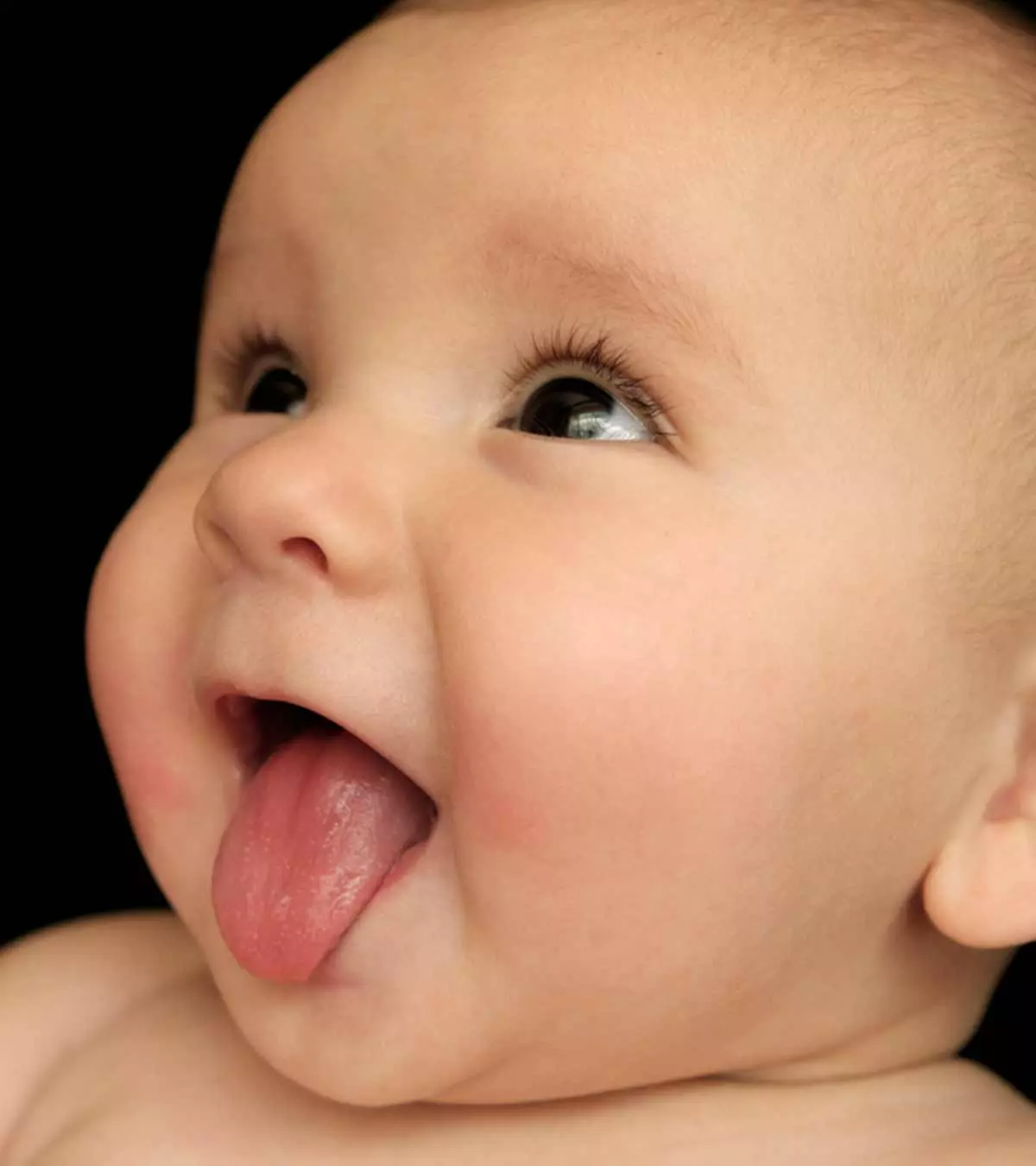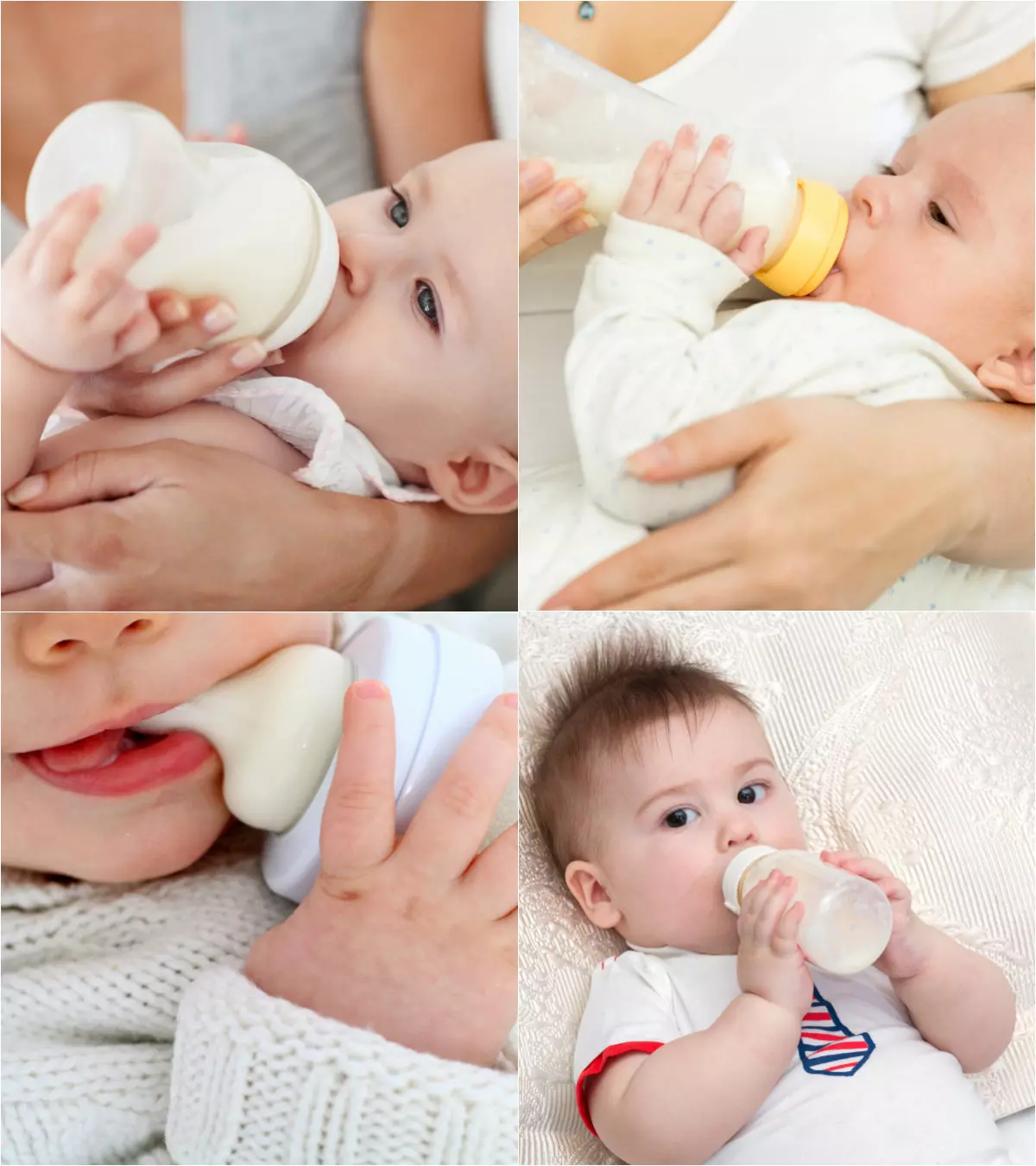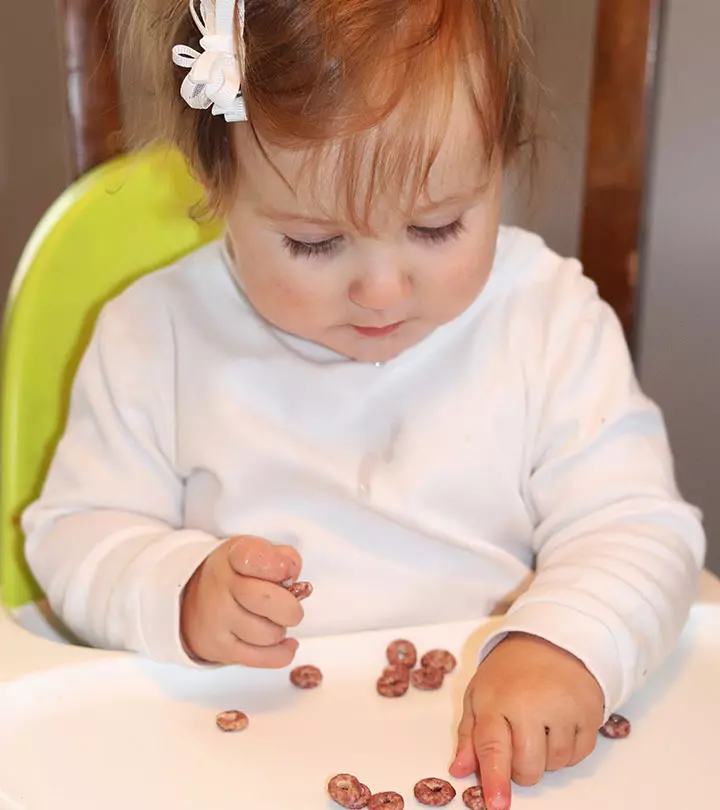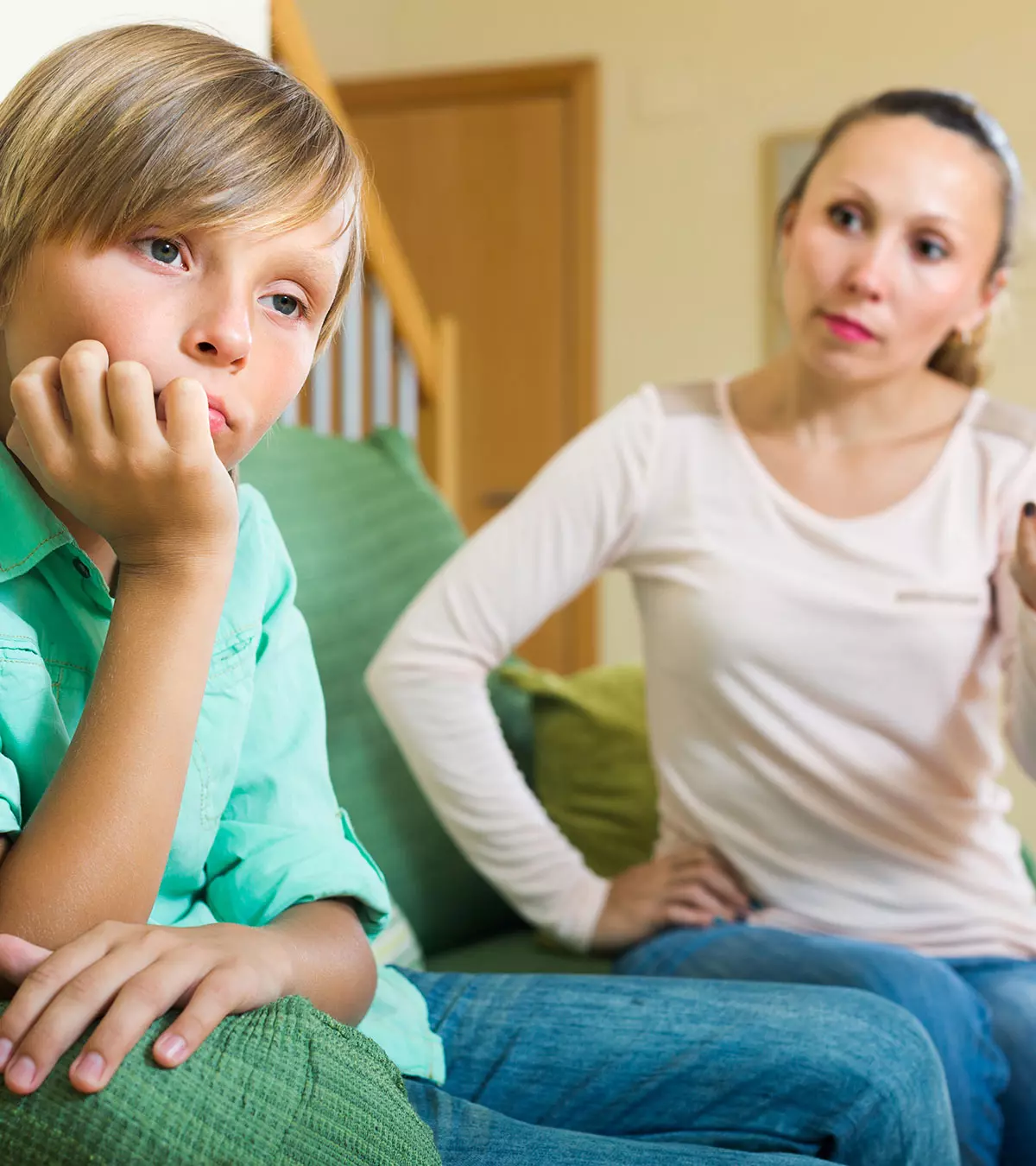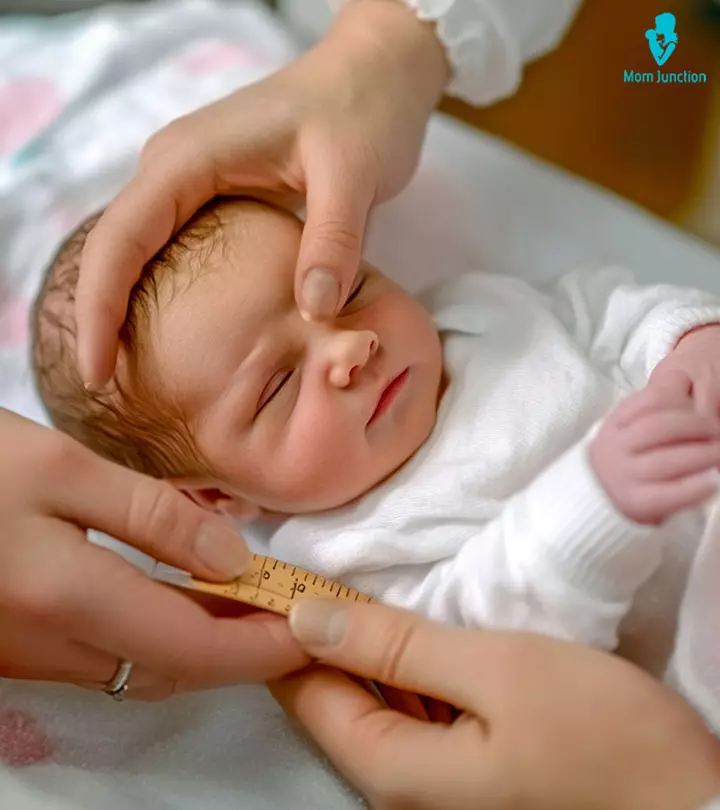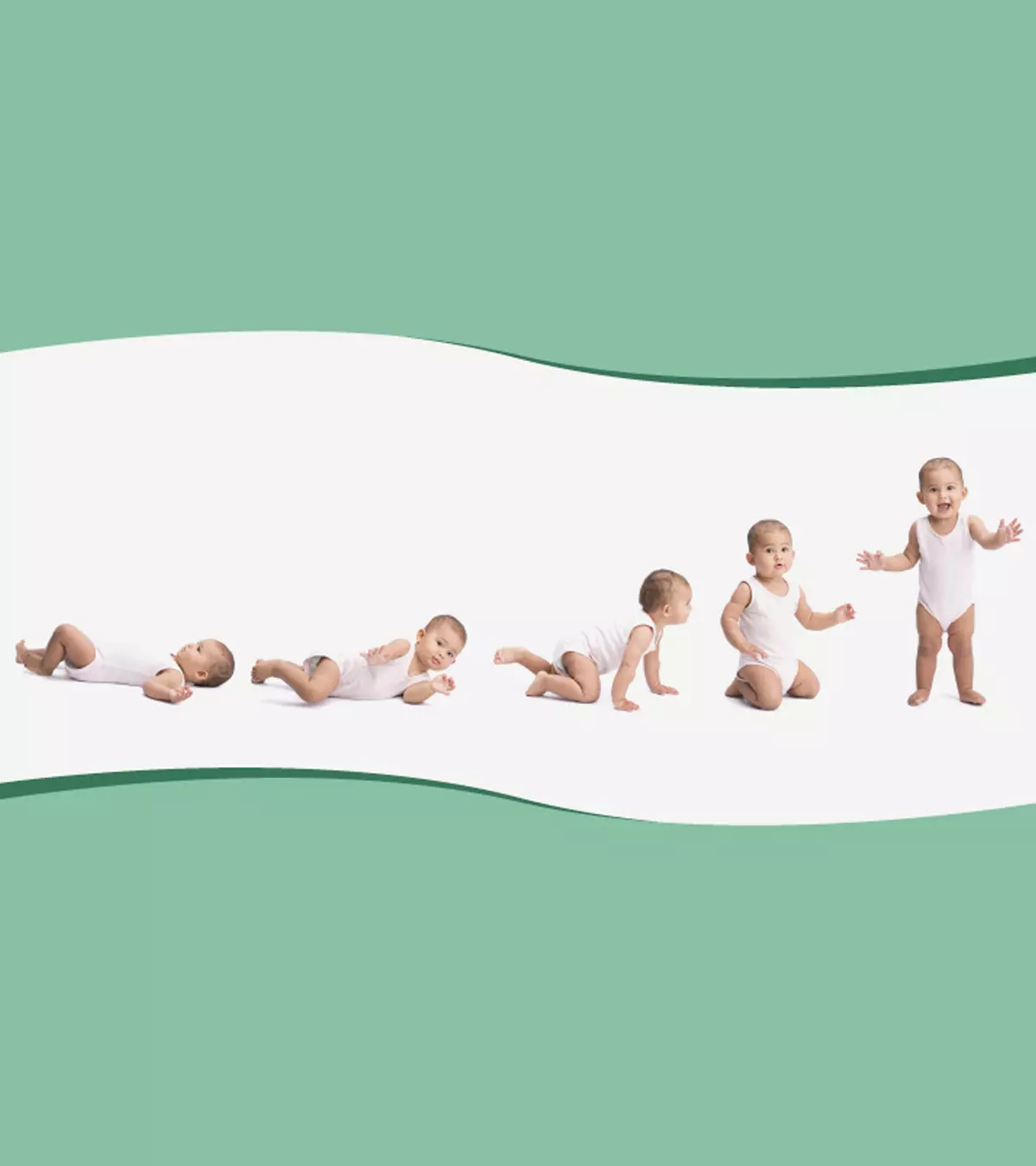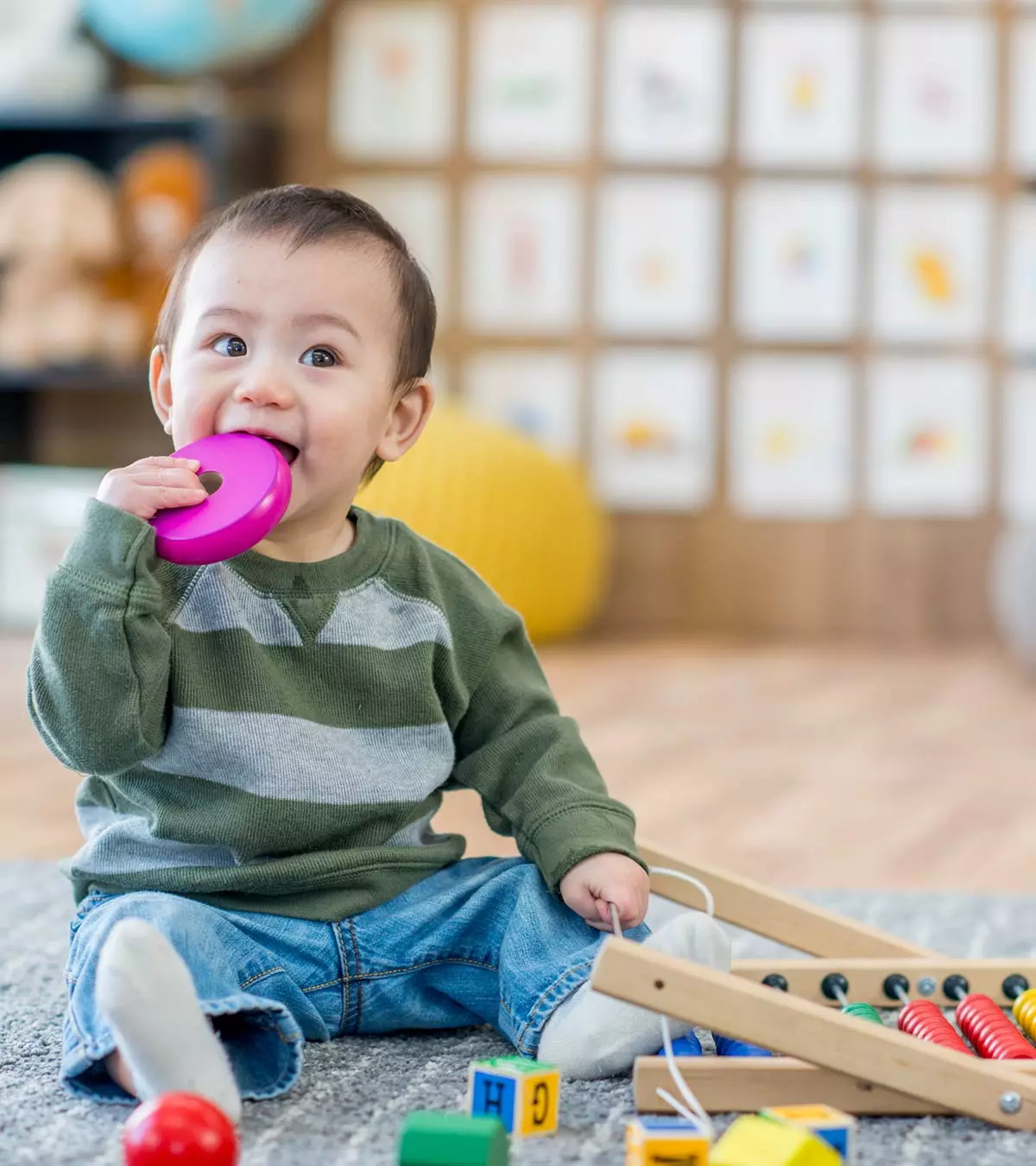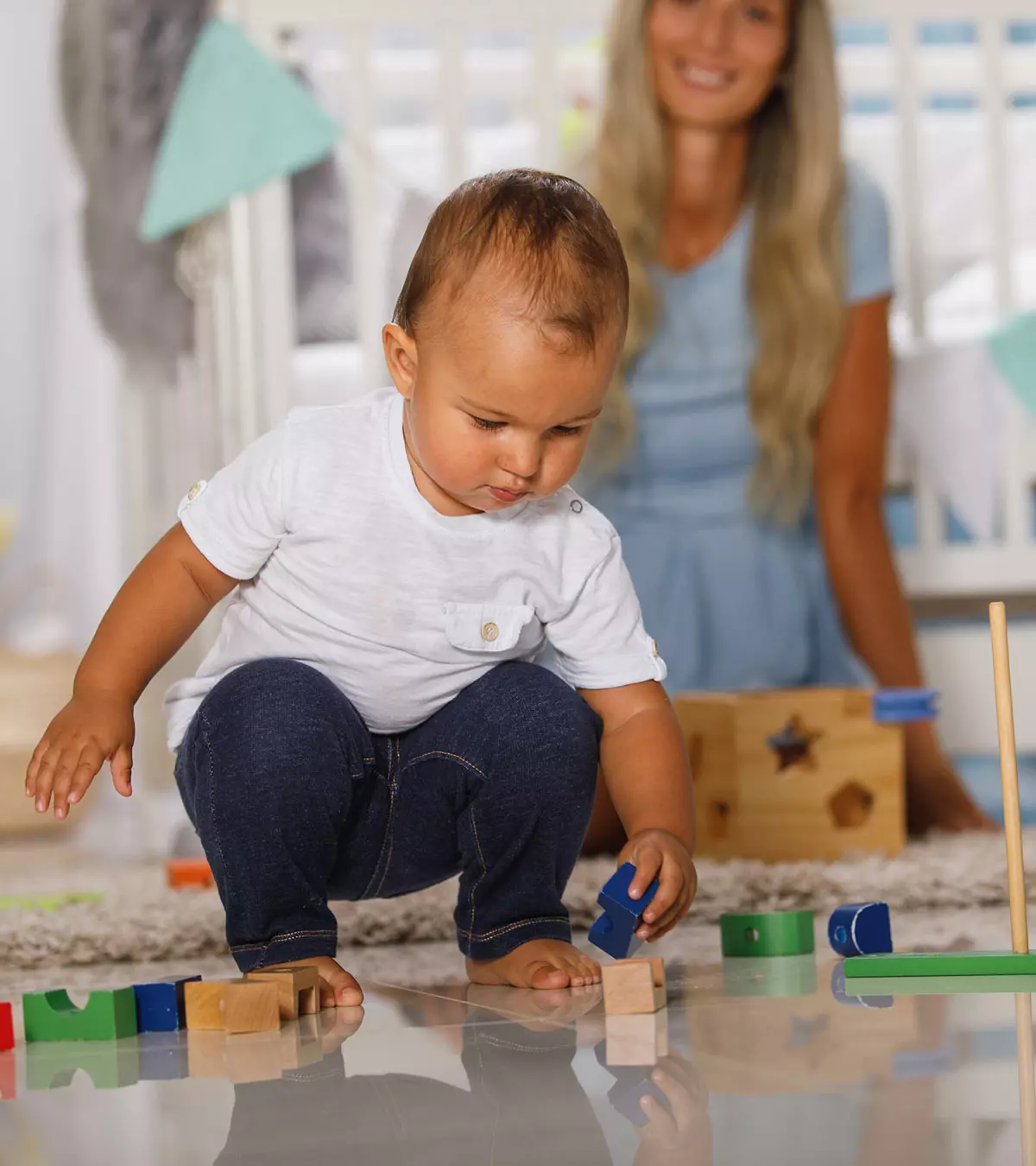
Image: ShutterStock
When we are young, we acquire and develop cognitive skills continuously. These are the skills that assist us in processing and responding to information. Cognitive activities for toddlers aid in the development of these mental capacities, allowing children to read, learn, understand, recall, and focus more quickly.

Infants and toddlers keenly observe their environment and continuously think, learn, and experiment. Cognitive skills serve as the foundation for the development of a child’s social, emotional, language, and communication attributes (1).
In this post, we share the various aspects of cognitive skill development in toddlers and activities to help improve them.
Key Pointers
- Children’s cognitive development begins within the first 24 months as they observe and pick up on the actions of people around them.
- The development proceeds in different stages, each involving a significant skill achievement.
- You may help your child reach these milestones with activities such as sound recognition, familiarizing with numbers and letters, puzzle-solving, and more.
At What Age Does A Child’s Cognitive Development Begin?
Your baby is filled with curiosity and is learning as soon as they start observing the surroundings. For instance, a two-month-old baby can pay attention to faces and follow moving objects with their eyes. Infants and toddlers watch their parents or elders in the family, listen to the language spoken around, make cooing noises, taste foods, hold or grab objects, or cuddle with their caregiver. Children may choose activities for exploration of their creative abilities. They learn in these ways (2).
Cognitive development continues till adulthood.
What Are Toddler Cognitive Skills?
As your baby grows there are various milestones of cognitive development. According to Jean Piaget’s sensorimotor stage (first stage of ‘theory of cognitive development’), infants and toddlers between zero and 24 months of age interact with the world around them. These sensory and motor experiences help them develop cognitive skills.
At each developmental stage, your toddler will develop newer and more complex skills. Let’s explore the various cognitive milestones in toddlers (3) (4).
- By the time your baby is between nine and 12 months of age, they can sit, stand, crawl, and even walk with support.
- A one-year-old will have a better understanding of the world than they had during infancy. They enjoy looking at picture books, imitating gestures made by others, putting one object into the other, manipulating them, recognizing words, and responding with sounds and gestures. They also begin understanding the concept of object permanenceiA child’s ability to know that objects continue to exist even though you cannot see or hear them. .
- When they are between one and two years of age, they start to differentiate between ‘me’ and ‘you,’ identify familiar objects and people, and try to respond to words.
- Toddlers who are between two and three years of age show increased independence and learn a lot by exploring the world around them. Cognitive skills that most two-year-olds have are:
- Imitation of their parent’s or family members actions
- Name objects in the books
- Identify their reflection in a mirror
- Understand and respond to instructions given by adults
- Ability to sort objects according to color, size, or type
- Grab and lay building blocks
How Do Toddlers Develop Cognitive Skills?
As babies grow, the nerve cells (neurons) in their brains branch out and form a new connection every time they learn something new. Each neuron can have multiple connections, and together, they form pathways (5).
Imagine these neural pathways to be the wiring system in your house. Each neural pathway is a circuit. While some pathways, like those that control breathing and digestion are present at birth, other pathways result from cognitive development. It means that the more your baby explores, learns, and interacts, the more pathways are formed. The more these pathways are used, the stronger they become. New neural pathways are formed when your toddler picks up different skills at different stages of development.
These early cognitive skills lay the foundation for complex cognitive abilities that emerge later in life.
Engaging Cognitive Activities For Toddlers
You can engage your toddler in innumerable activities to boost their cognitive development.
1. Sing along
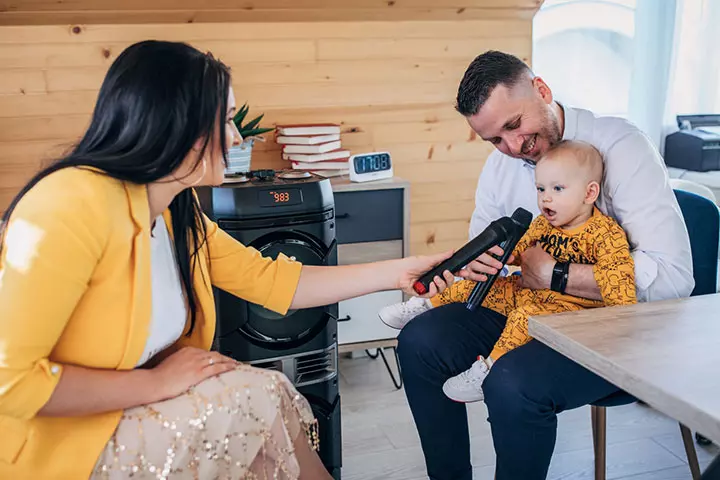
Music helps develop sensorimotor skills and cognition. Teach your toddler to sing after you or with a music player. It will entertain them and improve their social and emotional skills.
2. Practice animal sounds recognition
Toddlers love animals and are quick to pick up on their sounds. How about practicing animal sounds and asking your toddler to identify them?
3. Learn letters with flashcards
Using flashcards with toddlers is a great way to teach them and boost their memory. You can begin with letters and practice with them daily. This activity is sure to provide plenty of stimulation to your little one.
4. Practice matching simple puzzles
Get your toddler a two-piece puzzle that is easy to identify visually and enables your little one to use their memory and logic to complete them.
5. Learn colors with a color sorter
Colors are fun, attractive, and essential for your toddler’s cognitive development
. Get your baby a color sorter and teach them how to use it. It helps boost cognitive and logic skills in your toddler.
6. Understand cause and effect with button toys
An important part of cognitive development in your toddler is understanding the cause and effect phenomenon. A simple button toy that performs an activity, lights up, or gives out a sound is a fun way to teach your child cause and effect.
7. Practice stacking with wooden blocks

Allow your toddler to stack building blocks in any way they want. It allows them to imagine and get creative. Giving them some suggestions once in a while is useful.
8. Explore nature
Take your toddler on a nature walk and encourage them to collect leaves, stones, or flowers. Discuss the different colors, shapes, and textures of the items they find, which fosters exploration and observational skills. You may even come back home and make a nature-inspired art or craft with the items collected.
9. Explore textures with touch-and-feel toys
Toys for toddlers come in different shapes and materials. It is because toddlers are encouraged to touch and feel different textures and learn about them through sensory experiences.
10. Pretend-play with kitchen toys
Toddlers have a keen sense of imagination. Providing them kitchen toys allows them to use their imagination and creativity in their play. It is also a good way to teach them about food, tastes, and smell.
 Trivia
Trivia11. Practice passing through a bike course
Cognitive skills in your toddler are not limited to their mental skills. Set up a bike racecourse in the garden or draw a course with chalk and encourage your toddler to observe and pass through the course accordingly. They can explore using their hands and feet in coordination to move forward, backwards, and turn around, which improves their ability to understand the reactions and react appropriately during an outdoor play.
12. Set up a scavenger hunt
A scavenger hunt is one of the most engaging problem-solving activities for toddlers. It is a suitable pick for those who understand instructions better. Set up a treasure or scavenger hunt for your toddler and give them a reward to motivate them.
13. Play with musical instruments

Babies are instantly attracted to music and sounds of all kinds. Playing with rattles, banging on utensils, and beating on a drum with drumsticks improve your toddler’s dexterity and develop a sense of sound and music in them. Get them a toy musical instrument and encourage them to play it.
14. Let them help with chores
Fun activities with your toddler can be a learning opportunity for them. Allow your child to help you in daily chores such as cleaning their toys and putting the toys in the bin. These will instill a sense of responsibility, improve dexterity, and teach them to follow instructions.
Cognitive Activities To Boost A Toddler’s Memory
Here are some easy and fun activities that can boost your toddler’s memory.
15. Hide an object
Hide an object under the blanket or shuffle it between your hands. Ask your toddler to find the item. Such activities boost your child’s short-term memoryiThe ability to retain a small amount of information for a small amount of time. and visual memoryiThe ability to remember what you have already seen. and lays the foundation for object permanence. They also help foster a sense of exploration and discovery, which further helps in cognitive development.
16. Repeat songs and stories
Singing to your newborn or infant is recommended as the sounds and tunes could help in cognitive development. As your baby grows up to be a toddler, singing nursery rhymes, narrating stories with images, and encouraging sing-alongs are recommended. Once you feel your child is familiar with a rhyme or song, pause at a point and ask them to continue (6).
 Trivia
Trivia17. Memory card game
Create a simple memory card game using pairs of pictures or objects. Place them face down and take turns flipping them over to find matches. This game enhances memory and attention skills in toddlers.
18. Practice numbers and letters
You can keep repeating letters and numbers, and once they are acquainted with them, you can ask them to recollect.
Cognitive Activities To Improve A Toddlers’ Logic
Though underestimated, logic plays a critical role in your child’s life as they grow older. Here are a few things you can do to help your toddler develop logical abilities.
19. Set up simple daily routines

Build simple and defined routines and procedures. Stick to schedules for the toddlers bath, lessons, food, storytelling, activities, or going to the park. This teaches them to relate to the sequence and they expect one after the other. The routine also inculcates a sense of discipline in the child.
20. Hand them sorting-based games and toys
By the age of two years, your toddler will be able to identify objects and sort them. To encourage and strengthen their ability to sort things based on different parameters, you can ask them to sort toys, blocks, animals, colors, or ask them to choose their favorite. The routine can be incorporated during your daily outdoor sessions with your toddler too.
21. Give them puzzles
A great way to boost your toddler’s logic is by engaging them in matching games and puzzles. For example, a puzzle game where they need to match the animal puzzle piece with the puzzle piece of the sound they produce or a game in which different pieces fit in a specific, logical orientation.
22. Introduce simple coding toys
Engage toddlers with simple coding toys that require them to follow sequences to achieve a result. This encourages logical thinking and problem-solving skills.
Cognitive Activities To Boost A Toddlers’ Imagination and Creativity
Try these activities to boost your toddler’s imagination and creativity.
23. Get creative with art
Children are imaginative and creative. These traits are naturally present in them and can be further honed by creating art, crafts, and painting. For example, use playdough to make a miniature cat or dog and ask your child to follow your steps. After a few times, your child will create an object that they have seen or observed in the environment around them. A similar activity can be taught by asking them to draw or color. Use bright colors that are attractive to your toddler.
24. Engage in outdoor play and short visits

Unstructured play is equally essential for boosting your toddler’s imagination and creativity. Take your child out to a playground or open space to allow them to explore the world outside. A visit to a zoo, a picnic, or a similar experience can boost your child’s cognitive skills.
25. Provide experiences
Start with smaller experiences, but as your toddler begins to grasp more, you need to improvise and provide variety. You may well be sitting with a zebra, a lion, and an astronaut at a tea party hosted by your little one.
26. Get artistic with sidewalk chalk
You can stock up on materials that your child can use to get creative and keep them engaged. One such material is a blackboard and chalk. Let your child think freely and get creative while drawing on the board. It helps your child improve their motor skills, dexterity, and creativity—all of which are needed for cognitive development at this stage.
27. Try shadow play
In the shadow game, the goal is to tag other’s shadows. This simple and enjoyable activity works whether played with parents, in small groups, or with a larger crowd. Although toddlers are fascinated by the shadows, running can be tricky for their little feet. To ensure a playful element, all players can pretend to be slow dinosaurs or large animals, making it equally enjoyable for older kids to join in. This not only creates a level playing field for different age groups but also introduces a fun STEM aspect as children observe and understand how shadows move. Beyond the game, shadow play provides a unique opportunity for kids to practice essential social skills, making it an all-around delightful experience for everyone involved (7).
Unstructured Toddler Cognitive Activities Examples
While there are plenty of activities that can help boost your toddler’s cognitive skills, unstructured play or free play is equally important for their development. Unstructured play gives toddlers and children the freedom to imagine, explore, create, and play without any rules (8).
Freedom cultivates and boosts cognitive development along with physical and emotional development. Encouraging your toddler’s free play with children of the same age also helps build their social skills. A combination of structured and unstructured play makes children creative, innovative, imaginative, disciplined and helps them develop critical problem-solving and socialization skills as they grow up.
Outdoor games for toddlers can also be an excellent way to explore and interact with the world. However, toddlers can have just as much fun indoors. Some examples of unstructured indoor play include:
- Building with Lego blocks
- Playing with dough
- Playing with a kitchen set
- Playing with water
- Playing with figurines (cars and dolls)
- Playdates with other toddlers
- Narrating a story to friends or family members
- Freely emoting and dancing to music from various genres
Unstructured play is said to be an essential part of childhood and shapes the way your child thinks. Here are a few tips you can use to encourage your toddler during unstructured play.
- Keep lots of materials, such as age-appropriate toys, cardboard boxes, paper towels, blocks, storybooks, blank books, and playdough handy.
- Keep cognitive toys and books on shelves that are easily accessible to your toddler.
- Keep a designated space in their room where your child can just be themselves. It’s okay if they get messy while playing. Or you can have them play in the living room too, like how this anonymous stay-at-home mom created an obstacle race for her son, J. She says, “ I set up an obstacle course in the living room. Pillows on the floor were islands that he had to hop on. Pillows stacked on a chair was our mountain. A blanket thrown over the table created our cave. I pushed the couch up to the chair to create a ‘canyon’ in between. We talked about each landform in the obstacle course and went on a ‘bear hunt’ through the obstacle course. It’s so much more fun moms if you join in the climbing and hopping! And finally we played a game where I called out a landform and he had to climb, crawl or hop to it (i).”
How Does A Baby Rattle Help With Cognitive Development?
Rattles are one of the first toys your baby plays with. While in the first two or three months, your baby is attracted to the sound and movements of the rattle when you shake it, from four to seven months, they are likely to hold the rattle by themselves (9). You encourage them to shake the rattle and make noise. By doing so, your baby learns the purpose of a rattle.
Once your child is familiar with their rattle, play ‘hide the rattle’ with them. Shake the rattle to make noise wherever it is hidden as it encourages your child to understand object permanence and motivates them to look for it. Even in the first two or three months of your baby’s life, the rattle noise is a concept that helps boost your baby’s cognitive development.
Other benefits of using a baby rattle for cognitive development are:
- Different rattles make different noises
- Your infant learns to grasp, hold, and move the rattle, helping them develop their motor skills
- Many rattles are teethers, too
- Toddlers learn to imitate adults by moving the rattle just like the adults do
Your baby can start to observe and process information around them right from birth. By the age of two, they can recognize people and understand instructions after learning simple reactions to various stimuli and learning to differentiate colors. Since the surrounding environment and experiences influence these developments, this is the right age for toddlers to engage in different cognitive activities that encourage exploration and discovery. So, by involving children in these learning activities, you may help them accomplish these milestones and improve their sensorimotor experiences.
Infographic: How Does Scribbling Aid In Toddler Cognitive Development?
Most babies begin to scribble between 12 and 18 months of age. While scribbling doesn’t make much sense to adults, it provides toddlers sensory enjoyment and helps refine their fine motor skills such as grasping. Furthermore, it aids in their cognitive development, which often goes unnoticed. Our infographic highlights how scribbling contributes to a toddler’s cognitive development.
Some thing wrong with infographic shortcode. please verify shortcode syntax
Frequently Asked Questions
1. Is exercising a cognitive activity?
Yes, exercising can help improve cognitive function by promoting brain development, reducing stress, and releasing growth hormones. It is important to include exercise as a regular part of the routine to benefit from these cognitive benefits (10).
2. What type of exercise is best for cognitive function?
Cardio exercises like running, dancing, skipping, and jumping are ideal for improving brain function and supporting cognitive development in children. These activities can also enhance learning, retention, analytical ability, and focus (11).
3. What are some signs that a toddler may be experiencing delays in cognitive development?
Delayed walking, sitting, or crawling, unusually short attention span, difficulties in remembering things, lack of curiosity, delay in learning, trouble in logical thinking, speech delay, low memory span, and slow learning indicate a toddler is experiencing cognitive developmental delays (12).
4. Can you explain the connection between cognitive and language development in toddlers?
Cognitive and language development are closely linked together. When a toddler speaks or communicates appropriately, it is believed to reflect cognitive development (13). Toddlers exposed to a rich language environment are believed to be more likely to develop strong cognitive skills.
Illustration: Best Cognitive Activities For Toddlers Development

Image: Stable Diffusion/MomJunction Design Team
Your toddler is learning something new daily! Watch this video to learn how toddler play can help develop cognitive skills like problem solving, memory, and creativity. This simple play combines learning with fun!
Personal Experience: Source
MomJunction articles include first-hand experiences to provide you with better insights through real-life narratives. Here are the sources of personal accounts referenced in this article.
i. Shaving cream landforms and more; https://engagingtoddleractivities.wordpress.com/2012/02/27/shaving-cream-landforms-and-more/
References
1. What is Cognitive Development?, HelpMeGrow
2. Milestone Checklist, Centers For Disease Control And Prevention
3. Milestones for a 1-year-old, University of Michigan
4. Milestones for 2-Year-Olds, University of Michigan
5. A. Morin, How kids develop thinking and learning skills, Understood.org
6. Growing Minds With Cognitive Development Activities for Toddlers, Eerie Country Care Management
7. Shadow tag, The Genius of Play
8. Why Unstructured Play is Important to Child Development, HelpMeGrow
9. Ways to Use Rattles with Your Baby or Toddler, Care About Childcare at Utah Valley University
10. Regular exercise changes the brain to improve memory, thinking skills; Harvard Health
11. Physical Activity Promotes Brain Development, University of Nevada
12. Understanding Cognitive Developmental Delay in Children; WonderBaby
13. What Is Communication and Language Development; Help Me Grow MN
Community Experiences
Join the conversation and become a part of our nurturing community! Share your stories, experiences, and insights to connect with fellow parents.
Read full bio of Dr. Elena Shea
Read full bio of Rohit Garoo
Read full bio of Dr. Ritika Shah
Read full bio of Apoorva K






